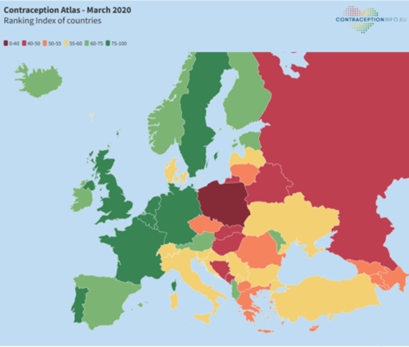CONTRACEPTION, A BURDEN CARRIED BY WOMEN
Annually, on March 8th, women’s rights are celebrated. However, most of those rights are escorted by a mental burden. Maternity rights imply the choice to use it. Using contraception involves being fully responsible for it. Abandoning contraception when whishing to become a mother suggests having to face body image criticism.


In similar scenarios, men and women are not exposed to the same fallout. Men and women can never be equal in a biological way. In the situation of sexual intercourse, one of them has more responsibility to carry than the other in terms of effects on their future, which is mainly why men are so indifferent and not involved enough with birth control. Being pregnant implies having to carry a child for 9 months, having to go through the pain of delivery, having to be responsible of the child for at least 20 years, but it also has an impact on the financial situation of an individual, which inevitably affects one’s mental health. We could imagine that this pressure could easily be shared equally between both parties taking part in the sexual intercourse, however that is not how things have usually gone. As quotes The Guardian on birth control, women happen to have to “carry the burden alone”. Even if sex requires at least two people, it seems as though women find themselves quite lonely when it comes to prevent a pregnancy.
It is seen as a valid and normal reaction for someone not to feel concerned about an issue when they are not subjected to it. Men do not have to worry about being pregnant. When it comes to contraception, reproduction turns to be a woman’s issue, they are perceived as “gatekeepers of sex”. Birth control represents an important factor in women’s daily mental charge. Yet again, the Government can play an important role in the alleviation of that responsibility by implementing measures, such as the reimbursement of the costs of contraception or counselling services. However, even if the European continent is not to be the most pitied, drastic differences still exist between nations, notably in terms of accessibility. To measure the importance of those gaps, the European Parliamentary Forum for sexual and reproductive rights (EPF) has created an interactive map (see below) ranking countries using colours from best to worst accessibility to contraception. If a country is coloured in green, it means the Government implemented measures ensuring a pretty wide access to birth control. However, the more it tumbles to warmer shades, the fewer the measures are. Amongst European countries, Belgium rises at the top with an accessibility score of 96.4% thanks to the reimbursement of “all contraceptives for women under 25”, as well as the morning after pill “for women of all ages”. On the opposite, unsurprisingly Poland comes last on the classification with the lowest score of accessibility of 35.1%. The EPF states that Poland is the only European country “going backwards in terms of contraceptives access” as its previous score was of 47,8%. The absence of any reimbursement for all contraception and the requirement of a “direct third-party consent for those seeking services […], even emergency contraception” resulted in “the creation of a new dark red colour category”.

As an eventual solution for sharing the responsibility of birth control, a few projects of a “male pill” have seen the light over the past decade. However, scientific progress is not the obstacle to its creation and marketing, men are. It is well known that due to its important concentration of hormones, contraception can cause side-effects. Men’s reluctance to take the pill is mainly explained by the “unwillingness […] to endure the […] side-effects similar to those of women’s birth control”. A patriarchal society has no compunction in subjecting women to undesirable effects but is hesitant about inflicting them to men. Thus, if men themselves seem hardly enthusiastic about being responsible for their own birth control, “pharmaceutical companies show little interest in developing or marketing them” as it is not profitable. It is therefore complicated for women to conceive a share of responsibility regarding birth control when the system itself seems to be satisfied with them taking full accountability for it.
This passive behaviour, even in the presence of scientific advances, is encountered as well in the cultural aspect of society. In order to write this article, some research was necessary. However, it is highly deceiving to notice that no movie really mentions contraception. The only brief allusion to that subject in fiction is the use of condoms, which is, of course, not to be neglected. But it is quite concerning to figure out that this theme is not addressed in cinema; as if it was a taboo, which enhances the fact that it “places the onus of contraception squarely on women's shoulders”. One of the very few creations on this matter is the June 2022 play “Pill” written by Rebecca Phythian shedding light on the contraceptive pill’s side effects many women experience, but are not talked about a lot.
By Myrtille Praire.
To go further, on our March file dedicated to feminism, you can read our Society and International Relations sections' articles on our blog.
Follow MINERVIEWS











